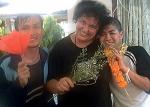Insurgency In The South of Thailand
Since January 2004, southern Thailand has been gripped by a shadowy insurgency that has killed over 1,000 people and divided local communities along religious and ethnic lines. “Bangkok,” ie the Thai government, has responded forcefully to the security threat, but the violence continues.
So who exactly is behind the insurgency? To shed light on this murky conflict and provide a regional perspective on the security threat, last night the Foreign Correspondents Club sponsored a panel discussion of some of the foremost researchers in this field. Zachary Abuza, professor of political science at Simmons College, Boston, an expert on Jemaah Islamiyah who was responsible for the Bali bombings and author of a forthcoming book on the conflict in southern Thailand joined Francesca Lawe-Davies, a Jakarta-based analyst for the International Crisis Group who covers Thailand for this respected think tank and Don Pathan, regional desk editor at the Nation, a frequent reporter on the complex political, ethnic and social make-up of the south.
There are concerns that the wave of bombings could eventually spread to other parts of Thailand. For decades, the Malay people in the three provinces in the south that were incorporated in recent history into Thailand, have resisted a forced assimilation into Thai buddhist culture. The three Thai pillars of nation, religion (Buddhist) and monarchy just doesn’t jive with Islam. The feeling in the south is that this is our land and why should we change for you? The panel agreed that the violence seems to be spurred by an ethno-nationalist movement that wants to reclaim Pattani as the Malay Muslim homeland…their historic Islamic Sultinate…that they are very proud of. It includes Islam but does not seem to be part of the international Wahabi religious jihad.
There seems to be no infighting among the younger generation of resistors that have spurred bragging rights in other areas like Iraq in order to get on the international radar screen. Rather the motivation of local cells working autonomously with periodic coordinated attacks seems to be religious purification with incredibly long term goals coupled with a separatist movement that resents the perceived lack of respect from the Thai government. There is a perception of neglect and a sense of injustice due to the killings and heavy handedness of the Thai military that has fostered fear and alienation which allows the insurgents to manipulate the locals.
Many insurgents report that they don’t believe they will be successful in their lifetimes. The panel agreed that there doesn’t seem to be an endgame to the violence as long as “Bangkok” refuses to let go of the mind set of assimilation and apologize for the government’s mistakes. And who believes that will ever happen?
Tags: Bangkok, Thailand, World Watching And Politics

